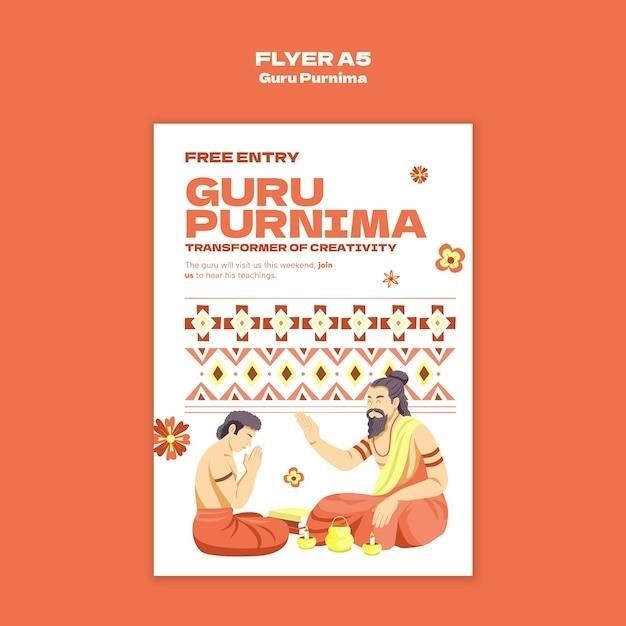
The Siddha Mangala Stotram‚ a powerful devotional hymn dedicated to Sripada Srivallabha‚ is widely cherished by devotees of Lord Dattatreya. This stotram is believed to hold immense spiritual power and is often chanted for attaining blessings‚ overcoming obstacles‚ and achieving spiritual liberation. The stotram is available in Telugu script and can be easily found in PDF format online.

Introduction
The Siddha Mangala Stotram‚ a revered devotional hymn in the Hindu tradition‚ holds a prominent place in the spiritual repertoire of devotees‚ particularly those who venerate Lord Dattatreya. This stotram‚ attributed to Sripada Srivallabha‚ a prominent saint and spiritual teacher‚ is believed to possess immense spiritual power and is often chanted for seeking blessings‚ overcoming obstacles‚ and attaining spiritual liberation. The stotram is widely acclaimed for its profound verses that encapsulate the essence of devotion‚ surrender‚ and the pursuit of spiritual enlightenment.
The Siddha Mangala Stotram is a testament to the profound spiritual insights and teachings of Sripada Srivallabha‚ who is considered an embodiment of divine grace and wisdom. The stotram’s verses are imbued with a deep understanding of the human condition‚ the nature of the divine‚ and the path to spiritual liberation. It serves as a beacon of guidance for those seeking to connect with the divine and navigate the complexities of life’s journey. The stotram’s popularity extends beyond geographical boundaries‚ with devotees across India and beyond finding solace and inspiration in its profound verses.
The Siddha Mangala Stotram is not merely a collection of words; it is a living testament to the transformative power of devotion and the enduring legacy of Sripada Srivallabha’s teachings. It continues to inspire and uplift countless individuals who seek solace‚ guidance‚ and a deeper connection with the divine. Its availability in Telugu script‚ particularly in PDF format‚ allows for easy access and dissemination‚ making it accessible to a wider audience who seek to embrace the spiritual wisdom enshrined within its verses.
Significance of the Siddha Mangala Stotram
The Siddha Mangala Stotram holds profound significance in the Hindu devotional tradition‚ particularly among devotees of Lord Dattatreya. This stotram‚ attributed to the esteemed saint Sripada Srivallabha‚ is not just a collection of verses but a powerful invocation imbued with divine grace and spiritual potency. Its significance lies in its ability to connect devotees with the divine‚ bestow blessings‚ and guide them towards spiritual liberation.
The stotram is believed to possess the power to remove obstacles‚ alleviate suffering‚ and bestow prosperity upon those who chant it with devotion. It is considered a potent instrument for attaining spiritual growth‚ purification‚ and liberation from the cycle of birth and death. The verses of the stotram are believed to resonate with the divine‚ creating an auspicious atmosphere that fosters spiritual transformation.
Chanting the Siddha Mangala Stotram is not merely a ritualistic practice; it is an act of devotion that connects the devotee with the divine essence of Sripada Srivallabha and Lord Dattatreya. It fosters a sense of surrender‚ humility‚ and gratitude‚ reminding devotees of the divine presence in their lives. The stotram’s significance lies not only in its spiritual potency but also in its ability to inspire and uplift those who engage with its verses‚ fostering a sense of hope‚ faith‚ and unwavering devotion.
Sripada Srivallabha and the Stotram
The Siddha Mangala Stotram is inextricably linked to the life and teachings of Sripada Srivallabha‚ a revered saint and spiritual master who is considered an incarnation of Lord Dattatreya. Sripada Srivallabha is renowned for his profound wisdom‚ miraculous powers‚ and unwavering devotion to Lord Dattatreya. He is believed to have composed the Siddha Mangala Stotram as a testament to his unwavering devotion and a means to guide devotees towards spiritual enlightenment.
The stotram is said to have originated from Sripada Srivallabha’s own spiritual experiences and insights. It is believed to encapsulate his deep understanding of the divine and his profound teachings on attaining spiritual liberation. The stotram is not just a mere composition; it is a window into Sripada Srivallabha’s spiritual journey and a reflection of his unwavering devotion to Lord Dattatreya.
Devotees of Sripada Srivallabha consider the Siddha Mangala Stotram to be a sacred treasure‚ a legacy passed down through generations. They believe that chanting this stotram with devotion allows them to tap into the grace of Sripada Srivallabha and receive his blessings. The stotram serves as a bridge connecting devotees to the spiritual wisdom and guidance of this revered saint‚ offering them a pathway towards spiritual enlightenment and a deeper understanding of the divine.
Benefits of Chanting the Stotram
The Siddha Mangala Stotram is believed to possess immense spiritual power‚ capable of bestowing numerous benefits upon those who chant it with devotion. Devotees of Lord Dattatreya and Sripada Srivallabha consider this stotram to be a potent instrument for spiritual growth‚ protection‚ and fulfillment. Chanting the stotram is said to purify the mind‚ cleanse the soul‚ and open the heart to divine grace.
One of the primary benefits associated with chanting the Siddha Mangala Stotram is the attainment of blessings from Lord Dattatreya and Sripada Srivallabha. Devotees believe that the stotram acts as a conduit for divine grace‚ allowing them to receive blessings for prosperity‚ good health‚ success‚ and spiritual progress. It is also believed to bestow protection from negative influences and ward off obstacles in life.
Chanting the Siddha Mangala Stotram is also said to cultivate inner peace‚ reduce stress‚ and promote mental clarity. The rhythmic chanting of the stotram is believed to calm the mind‚ soothe the soul‚ and create a sense of tranquility. Furthermore‚ it is believed to enhance concentration‚ improve memory‚ and foster a sense of spiritual awareness.
The Text of the Stotram in Telugu
The Siddha Mangala Stotram is a beautiful and powerful hymn composed in the Telugu language‚ a Dravidian language spoken primarily in the Indian state of Andhra Pradesh. The stotram is a lyrical expression of devotion to Sripada Srivallabha‚ a revered spiritual master and an incarnation of Lord Dattatreya. It is written in a rhythmic and melodious style‚ making it an inspiring and uplifting experience to chant.
The Telugu script‚ with its unique characters and flowing script‚ adds to the beauty and significance of the stotram. The words‚ carefully chosen for their meaning and sound‚ resonate with deep spiritual significance‚ evoking a sense of reverence and connection with the divine. The stotram is often recited in a devotional context‚ with each verse chanted with sincerity and devotion.
The availability of the Siddha Mangala Stotram in Telugu script in PDF format makes it easily accessible to devotees around the world. This allows individuals to engage with the stotram‚ learn its verses‚ and chant it with understanding and reverence. The PDF format provides a convenient and portable means of carrying the stotram and engaging in its recitation whenever and wherever desired.
Siddha Mangala Stotram in English Translation
For those who may not be familiar with the Telugu language‚ an English translation of the Siddha Mangala Stotram is readily available. This translation allows individuals from diverse backgrounds to appreciate the profound meaning and spiritual significance of the stotram. The English translation preserves the essence of the original Telugu text while conveying its devotional message in a way that is easily understood by English speakers.
The English translation of the Siddha Mangala Stotram provides a deeper understanding of the stotram’s verses‚ revealing the profound wisdom and spiritual insights contained within. It allows devotees to connect with the message of the stotram on a personal level‚ regardless of their linguistic background. The translation serves as a bridge between cultures‚ allowing individuals from different parts of the world to share in the devotional experience of chanting this powerful hymn.
The availability of the Siddha Mangala Stotram in both Telugu script and English translation makes it accessible to a wider audience. Devotees can choose the format that best suits their needs and preferences‚ whether they prefer to engage with the stotram in its original Telugu language or appreciate its meaning through an English translation. This accessibility ensures that the powerful message of the stotram can reach and inspire individuals from all walks of life.
Availability of the Stotram in PDF Format
The Siddha Mangala Stotram is readily available in PDF format‚ making it easily accessible to devotees seeking to incorporate this powerful hymn into their spiritual practices. The PDF format allows for convenient storage‚ printing‚ and sharing of the stotram‚ ensuring its widespread dissemination among those who wish to chant it. This digital format offers a practical and user-friendly way to access the stotram‚ eliminating the need for physical copies and allowing devotees to carry it with them wherever they go.
The availability of the Siddha Mangala Stotram in PDF format facilitates its use in various settings‚ from personal devotional practices to group recitations. Devotees can easily download the PDF to their devices‚ print it out for personal use‚ or share it with others who may be interested in exploring the stotram’s spiritual significance. The PDF format provides a convenient and accessible way to engage with the stotram‚ fostering a sense of community and shared devotion among those who resonate with its message.
The widespread availability of the Siddha Mangala Stotram in PDF format speaks to its enduring popularity and relevance in contemporary spiritual practices. The convenience and ease of access provided by this digital format have made it possible for individuals from diverse backgrounds to connect with the stotram and experience its transformative power. The PDF format serves as a testament to the enduring legacy of the Siddha Mangala Stotram‚ ensuring its continued presence in the lives of those seeking spiritual guidance and solace.
Recitation and Chanting of the Stotram
The Siddha Mangala Stotram is typically recited or chanted with devotion and reverence‚ often accompanied by traditional musical instruments or devotional singing. Devotees may choose to chant the stotram silently or aloud‚ depending on their personal preference and the setting. The act of chanting is believed to create a powerful vibration that resonates with the divine‚ invoking blessings and clearing obstacles.
Many devotees find solace and spiritual upliftment in the regular recitation of the Siddha Mangala Stotram. The rhythmic repetition of the verses and the focus on the divine attributes of Sripada Srivallabha can help to quiet the mind‚ promote inner peace‚ and cultivate a deep sense of connection with the divine. Chanting the stotram can also be a powerful way to release negative emotions and cultivate positive energy.
The Siddha Mangala Stotram can be chanted at any time of day‚ but it is often recited during specific periods of worship or during special occasions. Devotees may choose to chant the stotram before embarking on a new endeavor‚ seeking guidance‚ or seeking protection from harm. The stotram can also be chanted as part of a daily spiritual practice‚ offering a way to connect with the divine and cultivate inner peace throughout the day.
Devotional Practices and Rituals
The Siddha Mangala Stotram is often incorporated into various devotional practices and rituals associated with the worship of Lord Dattatreya and Sripada Srivallabha. These practices vary depending on individual traditions and preferences‚ but often involve elements of prayer‚ meditation‚ and offerings.
One common practice is to light incense or a lamp before chanting the stotram‚ creating a sacred and devotional atmosphere. Devotees may also offer flowers‚ fruits‚ or other symbolic offerings to the deity. Some practitioners may also engage in prostration or bowing as a sign of respect and humility.
Meditation is another integral part of many devotional practices involving the Siddha Mangala Stotram. Devotees may focus their attention on the meaning of the verses or on the divine qualities of Sripada Srivallabha during meditation. This practice can help to cultivate a deeper connection with the divine and promote inner peace and clarity.
Many devotees also observe a period of fasting or abstain from certain foods or activities while chanting the stotram. This practice is believed to enhance the spiritual benefits of chanting and to create a more focused and receptive state of mind. The specific rules and guidelines for these practices can vary depending on individual traditions and preferences.
Historical Context and Origins
The Siddha Mangala Stotram is deeply rooted in the rich history and tradition of the Dattatreya lineage‚ a prominent spiritual tradition in Hinduism. The stotram is attributed to Sripada Srivallabha‚ a revered sage and spiritual master who is considered an incarnation of Lord Dattatreya. Sripada Srivallabha is believed to have lived in the 14th century CE and was a prominent figure in the propagation of the Dattatreya teachings.
The stotram is said to have originated from the Sripada Srivallabha Charitamrutam‚ a biographical account of Sripada Srivallabha’s life and teachings. This text is a valuable source of information about the sage’s life‚ his spiritual practices‚ and the teachings he imparted to his disciples. The Siddha Mangala Stotram is one of the many devotional hymns found within this text‚ highlighting its significance within the Dattatreya tradition.
The historical context of the stotram is closely intertwined with the lineage of Dattatreya‚ a divine being who is believed to be an embodiment of the three major Hindu deities‚ Brahma‚ Vishnu‚ and Shiva. Dattatreya is revered as a teacher of spiritual wisdom and a guide to liberation. The Siddha Mangala Stotram‚ therefore‚ not only celebrates the life and teachings of Sripada Srivallabha but also reinforces the deep connection between the stotram and the larger Dattatreya tradition.
The Power of the Stotram
The Siddha Mangala Stotram is revered not merely as a devotional hymn but as a powerful spiritual tool that holds the potential to transform lives. Devotees believe that chanting this stotram with sincere devotion and faith can bring about profound benefits‚ both in this life and the next. The stotram’s power is attributed to its deep connection to the divine energy of Lord Dattatreya and the blessings of Sripada Srivallabha‚ the sage who is believed to have composed it.
One of the primary benefits attributed to the stotram is its ability to overcome obstacles and challenges. Devotees believe that the stotram’s vibrations create a protective shield around the individual‚ warding off negative energies and influences. It is also said to bestow courage‚ strength‚ and resilience in the face of adversity‚ helping individuals to navigate life’s difficulties with grace and determination.
Beyond its worldly benefits‚ the Siddha Mangala Stotram is considered a powerful tool for spiritual growth and liberation. Chanting this stotram is believed to purify the mind and heart‚ fostering devotion‚ surrender‚ and a deeper connection to the divine. It is said to awaken spiritual awareness‚ promoting inner peace‚ tranquility‚ and a sense of oneness with the universe. The stotram is often recommended for those seeking to deepen their spiritual practice and embark on a journey of self-discovery.



